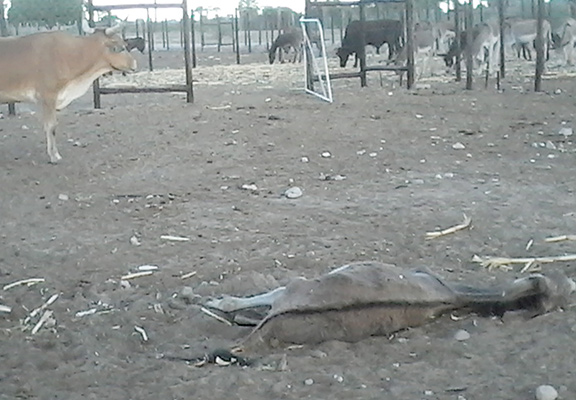A LEGAL battle is looming between the Okahao Town Council in the Omusati region and local livestock farmer Jason Nashinge, whose 46 adult goats were impounded by the council after having strayed into town on 2 August last year.
All but three of the goats died while in the council’s custoday as at the end of last month.
Nashinge’s brother and animal welfare activist, Isaac Nashinge, said the owner of the goats was notified in writing 28 days after his goats were impounded, but did not immediately reclaim them because they were impounded “under questionable circumstances while allegedly grazing unattended within the yard of the Okahao Police Station”.
There is also a discrepancy on the number of goats impounded.
Nashinge puts the number at 46, but the town council talks of about 44 goats only.
A letter written by the pound master, Martin Simon, dated 14 November 2017 states that “36 of the 44 goats died of unknown causes”, and that only 8 remained.
However, on 24 February when visited the pen where impounded animals are kept, there were only three goats left.
Nashinge described the death of his goats as “genocide”, and said he will explore all possible avenues to seek redress.
Okahao’s chief executive officer, Timoteus Namwandi, explained that when an impounded animal dies, the death is properly recorded in a registry book and the carcass destroyed.
“If the owner of a dead animal feels that his or her animal was not impounded according to the regulations or that it died due to negligence, he or she is free to seek redress through the legally established channels,” he said.
On 12 February, Namwandi wrote to Nashinge to inform him that the issue of the impounded goats had been discussed by council on 22 January, and is now being dealt with by the council’s lawyer and his brother Jason Nashinge’s lawyer.
Like all other northern towns, Okahao has within its boundaries modern buildings accommodating businesses, government and non-governmental institutions’ offices, and modern houses as well as traditional homesteads, which were there long before Okahao was proclaimed a town.
And like other northern towns, Okahao faces the problem of big and small livestock straying into town, causing conflict between local authority officials and livestock farmers.
Namwandi said the issue of livestock straying into town was addressed by all stakeholders, and consensus was reached that livestock farmers within the boundaries of the town should let their animals graze in the undeveloped areas of the town, but they must make sure that those animals do not stray into the developed areas of the town.
He said the town council only impounds livestock which stray into the business district and residential areas because investors complained about the damage caused to their gardens, and the discomfort of animals lying at the front doors of their businesses and houses during the night as well as those roaming freely on the streets, interfering with traffic flow.
“Initially, we merely chased the animals away, but that did not solve the problem as the animals kept coming back. We had to impound them – something we did not want to do,” he stressed.
He said after an animal is impounded, the next step is to trace its owner, and inform him or her accordingly.
“But we have a problem with donkeys. Unlike cattle and goats, donkeys do not ordinarily have identification marks which could help us trace their owners,” he added.
Regulations stipulate that impounded animals should be fed and provided with veterinary care where necessary, but the costs of such services are then passed on to the owners.
An elderly resident of the Uukwalumbe village, Kwatsa Fritz, told The Namibian that her two donkeys were impounded at the end of last year. She then went to reclaim them last month, but was asked to pay N$3 800 – an amount she could not afford.
“Let my donkeys die in their care because I do not have that kind of money,” she said.
Namwandi said Fritz was not supposed to just walk away. “We can talk, and see how much she can pay now or even later,” he added.
Namwandi further said that if an impounded animal is not reclaimed within 30 days, the council has the prerogative of auctioning it.
“However, we did not auction any animals since last year because we wanted to give the owners enough time to reclaim them. Unfortunately, we found ourselves in a dilemma, mostly with regards to donkeys. A donkey feeds day and night, and when kept in a kraal for a prolonged time, it becomes stressed and dies,” he said.
When visited the municipal kraal on 24 February, there was one dead donkey. Local residents reported seeing two more dead donkeys on 1 March.
The Society for the Prevention of Cruelty to Animals in the Oshana region recently threatened legal action against the Okahao Town Council, alleging that impounded livestock were being kept in deplorable conditions.
Stay informed with The Namibian – your source for credible journalism. Get in-depth reporting and opinions for
only N$85 a month. Invest in journalism, invest in democracy –
Subscribe Now!










